Select Language

Updates with the latest moves, milestones
Investing.com-- Gold prices surged to hit a new record high in Asian trading on Tuesday, buoyed by sustained safe-haven appeal over elevated U.S.-China trade tensions, and concerns around President Donald Trump’s plan to overhaul the Federal Reserve.
As of 00:27 ET (04:27 GMT), Spot Gold jumped 1.7% to $3,482.76 per ounce, while Gold Futures expiring in June surged 1.9% to $3,491.20 an ounce.
Gold jumped more than 3% on Monday and has hit consecutive record highs in the previous three sessions, driven largely by escalating geopolitical risks, strong central bank demand, and persistent inflation concerns.
Trump mulls ousting Fed’s Powell, dollar hits 3-yr low
The latest rally was sparked by concerns surrounding U.S. monetary policy, after President Donald Trump unveiled plans to overhaul the Federal Reserve.
White House economic advisor Kevin Hassett said on Friday that President Trump and his team were continuing to study whether they could fire Fed Chair Jerome Powell.
Trump on Monday reiterated his call for the Fed to reduce rates, saying the U.S. economy could slow down if the Fed does not cut interest rates immediately.
Last week, Powell said that the central bank was not inclined to cut interest rates in the near future, citing the possible inflationary pressures and economic uncertainties stemming from the new tariffs.
These developments have stoked concerns about the independence of the Fed, sending ripples through financial markets.
The U.S. dollar remained weak after slumping to a three-year low on Monday against a basket of major currencies.
A weaker dollar tends to bolster demand for gold, as it makes the metal more affordable to investors holding foreign currencies.
US-China trade tensions remain elevated
China issued a stern warning to nations contemplating trade agreements with the U.S. that could undermine Chinese interests.
The Chinese Ministry of Commerce accused Washington of employing tariffs and monetary sanctions to coerce countries into limiting their trade with China.
Beijing emphasized that any such agreements detrimental to its interests would prompt reciprocal countermeasures.
This warning comes amid escalating tensions in the ongoing Sino-U.S. trade conflict, which has seen the U.S. impose tariffs of up to 145% on Chinese goods, leading to retaliatory duties from China.
Among other precious metals, Silver Futures gained 0.8% to $32.795 an ounce, while Platinum Futures rose 1% to $976.10 an ounce.
Copper hits 2-week high on weaker greenback
Copper prices extended on Tuesday to hit a two-week high as the greenback remained weak, but concerns of hefty U.S. tariffs on top importer China kept investors cautious.
Benchmark Copper Futures on the London Metal Exchange rose 1% to $9,311.60 a ton, while Copper Futures expiring in May gained 1.1% to $4.7713 a pound.
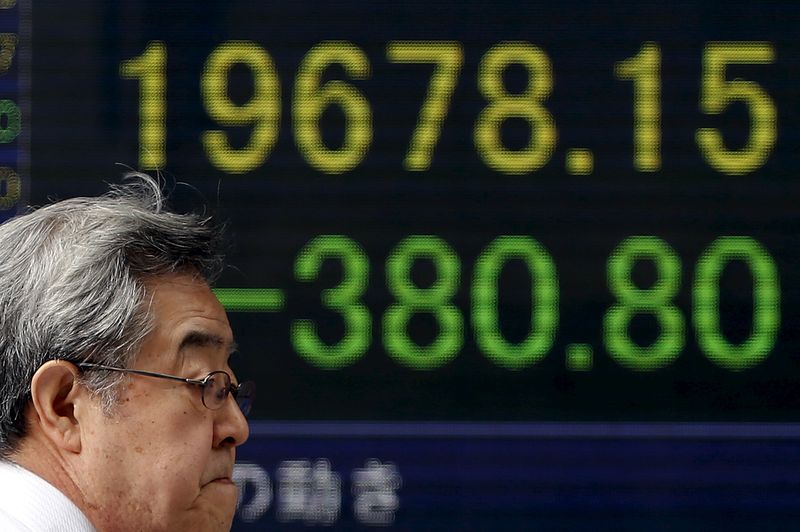
Most Asian stocks moved in a flat-to-low range on Tuesday as investors remained on edge over U.S. President Donald Trump’s trade tariffs and his persistent criticism of Federal Reserve Chair Jerome Powell.
Trump’s comments on Powell, specifically that the U.S. risks a recession if the Fed does not cut interest rates, sparked steep losses in Wall Street on Monday, a measure of which spilled over into Asia.
But U.S. stock index futures rose in Asian trade, with S&P 500 Futures up 0.6% amid signs of a potential rebound. Focus was on key upcoming first-quarter earnings this week, with Tesla Inc (NASDAQ:TSLA) to report later in the day.
Sentiment towards Asian markets remained weak as the U.S. and China showed few signs of deescalating a bitter trade war. Fears of tighter monetary conditions in Japan also weighed.
China stocks flat, Hong Kong dips; China warns against US trade deals
China’s Shanghai Shenzhen CSI 300 and Shanghai Composite indexes moved in a tight range on Tuesday, while Hong Kong’s Hang Seng shed 0.5% as trade resumed after a long weekend.
E-commerce stocks JD.com and Meituan slumped over 6% each, amid growing signs of heated competition in the lucrative food delivery sector.
China’s Commerce Ministry on Monday warned countries against striking trade deals with the U.S. at Beijing’s expense, while also accusing Washington of abusing tariffs.
Beijing’s comments come amid a bitter trade war between the world’s biggest economies, after Trump hiked tariffs on China to 145% earlier in April. China retaliated with a 125% levy on U.S. goods.
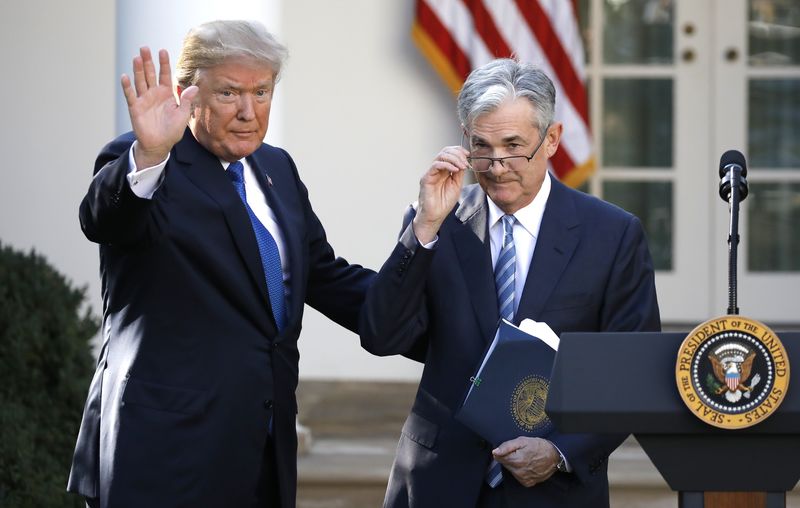
If tariffs weren’t enough for markets to contend with, President Donald Trump has thrown another major worry into the market with the calling of the head of Federal Reserve Chairman, Jerome Powell.
Trump has been calling on Powell to lower interest rates and last week called for his termination following hawkish comments from the Fed Chairman.
“Powell’s termination cannot come fast enough!” Trump stated last Thursday after calling him “too late” to cut rates.
Trump upped the ante on Monday, calling on Powell to initiate “preemptive cuts” or risk a slowing economy.
“With these costs trending so nicely downward, just what I predicted they would do, there can almost be no inflation, but there can be a SLOWING of the economy unless Mr. Too Late, a major loser, lowers interest rates, NOW,” Trump stated.
Unfortunately, it is Trump’s tariff policy that has Powell & Co. tightly on hold.
In his speech last week in Chicago, Powell highlighted that “[t]ariffs are highly likely to generate at least a temporary rise in inflation.” He also warned that their effects “could also be more persistent.” The Fed Chairman promised to wait for “greater clarity before considering any adjustments to our policy stance.”
Market watchers view the standoff between Trump and Powell as a power struggle over the Fed’s independence, which has markets worried.
Powell’s term as Fed Chairman runs through May of 2026, so there are legal questions arising if Trump has the authority to remove him before that.
“The risk is now twofold. First, that Powell holds the line and policy stays restrictive longer than markets had priced,” Nigel Green, CEO of deVere Group stated. “Second, that Trump intervenes—publicly or politically—sparking concerns over central bank independence.”
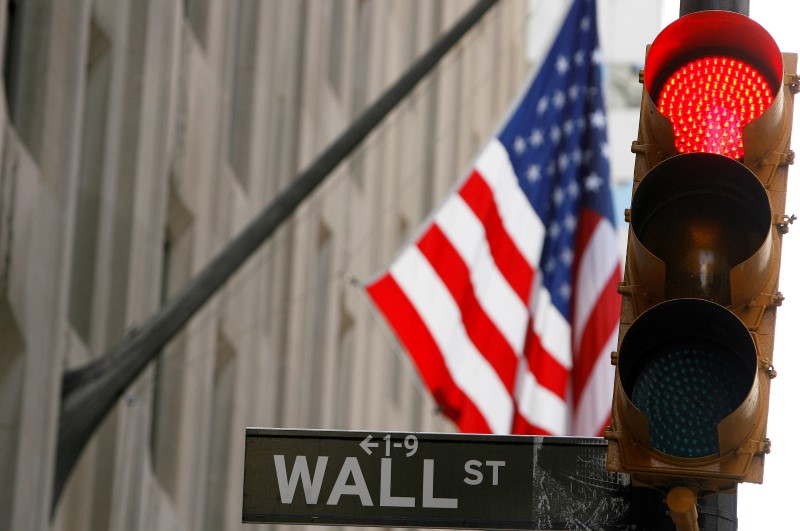
U.S. stock index futures fell on Monday evening, extending losses from a sharp fall on Wall Street as President Donald Trump’s fresh attack on Federal Reserve Chair Jerome Powell battered sentiment.
Investors remained on edge amid uncertainty over Trump’s plans for steep trade tariffs, even as his administration flagged several trade agreements.
Markets were also testy before a string of key technology earnings due this week, with electric car-maker Tesla (NASDAQ:TSLA) set to report on Tuesday.
S&P 500 Futures fell slightly to 5,183.25 points, while Nasdaq 100 Futures fell 0.1% to 17,904.0 points by 19:11 ET (23:11 GMT). Dow Jones Futures edged lower to 38,20.0 points.
Trump’s Powell comments, tariff uncertainty rattle Wall St
Futures fell following a deeply negative session on Wall Street, as Trump kept up his criticism of Powell and called for “preemptive” interest rate cuts, warning that the economy would slow otherwise.
Trump also kept up his harsh rhetoric against Powell, after having earlier called for the Fed Chair’s removal, sparking concerns over the Fed’s independence under Trump. Powell’s term ends only in May 2026, and it is unclear if Trump will be able to remove the Fed Chair before this.
Powell had last week warned that Trump’s tariffs could underpin inflation, and that the Fed will stay its hand until it has more clarity on the tariffs and their impact.
Trump’s comments on interest rates, coupled with persistent uncertainty over his tariff agenda, saw Wall Street end sharply lower on Monday. The S&P 500 fell 2.4% to 5,158.20 points, while the NASDAQ Composite slid 2.6% to 15,870.90 points. The Dow Jones Industrial Average fell 2.5% to 38,170.41 points.

JAKARTA (Reuters) -South Korea’s LG Energy Solution has formally withdrawn from a 142 trillion rupiah ($8.45 billion) project in electric vehicle battery making in Indonesia, the company said on Monday.
LGES and the Indonesian government signed a deal on the so-called Indonesia Grand Package project in late 2020, which include investments across the EV battery supply chain.
"Taking into account various factors, including market conditions and investment environment, we have agreed to formally withdraw from the Indonesia GP (Grand Package) project," LGES said in a statement.
"However, we will continue to explore various avenues of collaboration with the Indonesian government, centring on the Indonesia battery joint venture, HLI Green Power," it added.
HLI Green Power is a joint venture led by LGES and Hyundai Motor (OTC:HYMTF) Group. The company last year inaugurated Indonesia’s first battery cell production plant for EVs with annual capacity of 10 Gigawatt hours of battery cells, with plans to expand the capacity in the second phase of investment.
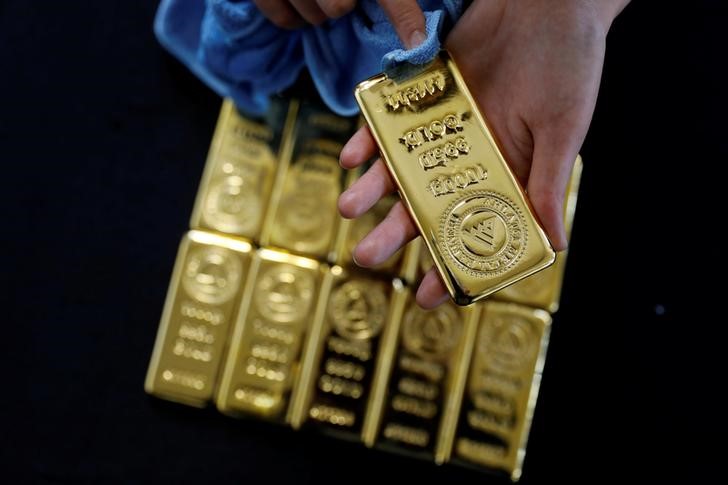
Gold prices surged to a new record high in Asian trading on Monday, as the dollar tumbled amid President Donald Trump’s plan to overhaul the Federal Reserve, while heightened Russia-Ukraine tensions after a brief Easter truce boosted bullion’s safe-haven appeal.
As of 03:40 ET (07:40 GMT), Spot Gold jumped 1.4% to $3,374.93 per ounce, after reaching a record high of $3,385.27 per ounce earlier in the session.
Gold Futures expiring in June surged 1.8% to $3,388.20 an ounce.
The recent climb in gold prices has been driven largely by escalating geopolitical risks, strong central bank demand, and persistent inflation concerns.
Gold rallies as Trump’s Fed overhaul plan raises uncertainty
Monday’s rally was largely driven by renewed uncertainty surrounding U.S. monetary policy, after President Donald Trump unveiled plans to overhaul the Federal Reserve.
White House economic advisor Kevin Hassett said on Friday that President Trump and his team were continuing to study whether they could fire Federal Reserve Chair Jerome Powell.
This stoked concerns about the independence of the Fed, sending ripples through financial markets.
The news weighed heavily on the U.S. dollar, which slumped to a three-year low against a basket of major currencies.
A weaker dollar tends to bolster demand for gold, as it makes the metal more affordable to investors holding foreign currencies.
Russia-Ukraine tensions escalate after one-day truce
The yellow metal was also supported by heightened tensions between Russia and Ukraine despite a one-day ceasefire announced by Russian President Vladimir Putin.
Putin unexpectedly announced a one-day ceasefire in Ukraine on Saturday to mark the Orthodox Easter holiday.
However, Russia launched missile and drone strikes on Ukraine early Monday, just hours after the expiration of the ceasefire.
Both Kyiv and Moscow have accused each other of violating the truce, which the Kremlin had confirmed would not be extended.
Among other precious metals, Silver Futures gained 1% to $32.773 an ounce, while Platinum Futures were unchanged at $978.0 an ounce.
Copper prices rise on weaker greenback, US-Sino tensions cap gains
Copper prices rose on Monday as the greenback weakened, but gains were limited due to concerns of hefty U.S. tariffs on top importer China.
China has been slapped with a total of 145% tariffs.
Benchmark Copper Futures on the London Metal Exchange rose 0.3% to $9,231.0 a ton, while Copper Futures expiring in May gained 0.8% to $4.4733 a pound.
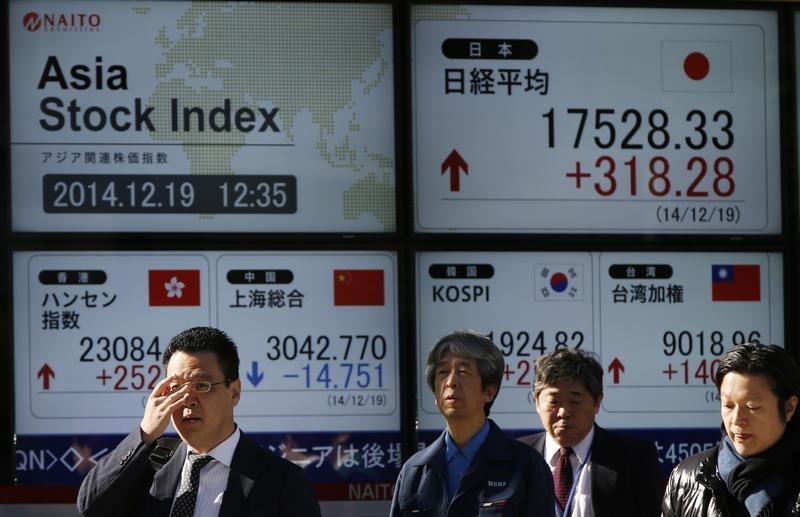
Asian stocks were mixed in Monday’s holiday-thinned session, as Chinese equities rose after the country’s central bank kept loan prime rates steady, while Japanese shares fell after stronger-than-expected inflation data from last week.
Stock markets in Australia, New Zealand, and Hong Kong were closed for the Easter holiday, contributing to lower trading volumes and subdued moves across the region.
Major U.S stock indexes suffered weekly losses last week, while futures tied to these benchmark indexes opened lower in Asian trading on Monday.
China stocks edge up, PBoC keeps loan prime rate unchanged
Data on Monday showed that the People’s Bank of China held its benchmark loan prime rate steady, in line with expectations, signaling Beijing’s preference for boosting economic growth through fiscal measures rather than additional monetary easing.
The PBOC left its one-year LPR at 3.1%, while the five-year LPR, which is used to set mortgage rates, was left at 3.6%.
Chinese authorities have recently proposed additional measures to boost consumer spending, including enhanced social welfare programs and subsidies for household goods.
China’s Shanghai Composite edged 0.3% higher, while the Shanghai Shenzhen CSI 300 gained 0.2%.
Japan’s Nikkei drops after strong CPI print complicates BOJ rate path
Data on Friday last week showed that Japan’s core consumer price index (CPI), which excludes fresh food prices, grew 3.2% y-o-y, matching estimates, but above the 3.0% rise seen in February.
The reading is closely watched as a gauge of underlying inflation by the Bank of Japan, and it remained well above the central bank’s 2% annual CPI target.
Despite rising inflation, analysts moved their rate hike forecast from May to July, citing uncertainty around U.S. tariff policies.
Japan’s Nikkei 225 index fell 1.2% on Monday while TOPIX declined 1.1%.
Investors remain cautious around Trump tariffs
Investors were still cautious in light of the ongoing global economic uncertainty fueled by trade tariffs introduced by U.S. President Donald Trump.
Trump’s trade tensions with China remain elevated. Last week, Bloomberg reported that China was open to beginning trade talks with the Trump administration, but demanded that the White House show more respect.
U.S. President Donald Trump has also said “big progress” was made after a meeting with a Japanese trade delegation in Washington last week.
These developments alleviated some concerns, although investors still remained on edge.
South Korea’s KOSPI was largely unchanged.
Thailand’s SET Index fell 0.4%, while Singapore’s Straits Times Index gained 1%.
Futures for India’s Nifty 50 were 0.4% higher.
A core reading that excludes both fresh food and energy prices also rose 2.9% in March from 2.6% in the prior month. ]
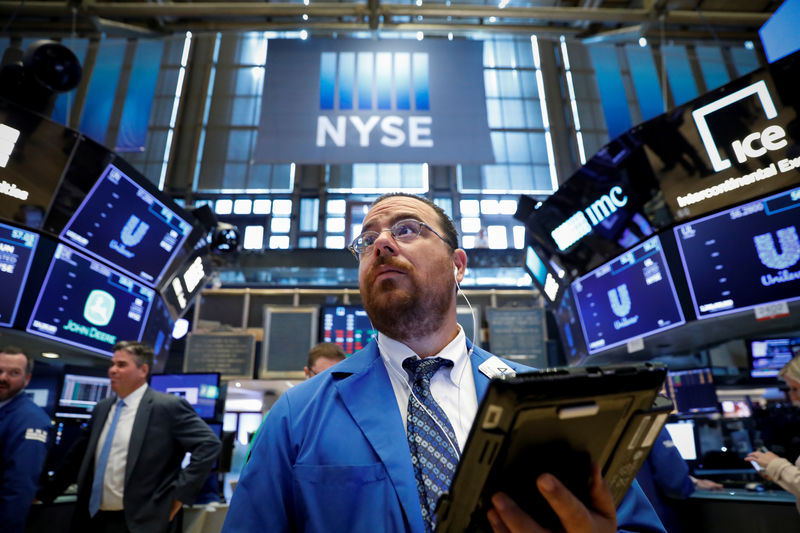
U.S. stock futures dipped Sunday evening after weekly losses on Wall Street, as ongoing trade tariff concerns continued to pressure market sentiment, while investors braced for a packed earnings week with key reports from Tesla (NASDAQ:TSLA), Boeing (NYSE:BA), and Alphabet (NASDAQ:GOOGL) on the horizon.
The Easter holiday across many markets on Monday, following a shortened trading week due to Good Friday, led to muted trading volumes.
S&P 500 Futures dropped 0.4% to 5,293.25 points, while Nasdaq 100 Futures declined 0.4% to 18,316.25 points by 20:08 ET (00:08 GMT). Dow Jones Futures also lost 0.4% to 36,169.0 points.
Wall St suffers weekly loss amid tariff uncertainty, earnings jitters
Major Wall Street indexes suffered weekly declines on Thursday, driven by hefty losses in Unitedhealth Group (NYSE:UNH), the largest U.S. health insurance company. Its stock dropped 22% after the health insurer cut its annual profit forecast in anticipation of higher-than-expected medical costs.
In the prior week, investors also witnessed market darling Nvidia (NASDAQ:NVDA) warning of a $5.5 billion charge in the first quarter due to U.S. chip sanctions on China. This dented market sentiment across the tech sector.
The Dow Jones Industrial Average closed 1.3% lower on Thursday, while the S&P 500 index inched up 0.1%, and the NASDAQ Composite fell 0.1%. Markets were closed on Friday to observe the Good Friday holiday.
All three indices closed lower for the week, with more than 2% pullback in Dow and Nasdaq.
Investors mulled over President Donald Trump’s tariff moves.
Last week, Trump declared “big progress” in talks with Japan during discussions in Washington, boosting hopes for negotiations between the U.S. and its key trading partners regarding tariffs.

SEOUL (Reuters) -South Korea’s exports for the first 20 days of April fell 5.2% from a year earlier, dragged down by U.S.-bound shipments, customs data showed on Monday, amid President Donald Trump’s sweeping tariff policies.
From this month, the U.S. has introduced 10% blanket tariffs and 25% auto tariffs, while 25% reciprocal tariffs on South Korea are currently paused for 90 days.
Exports to the U.S. fell 14.3%, while those to China, which is in a trade war with Washington, declined 3.4%. Shipments to the European Union rose 13.8%.
By product, exports of automobiles fell 6.5% and auto parts lost 1.7%, while semiconductors rose 10.7%.
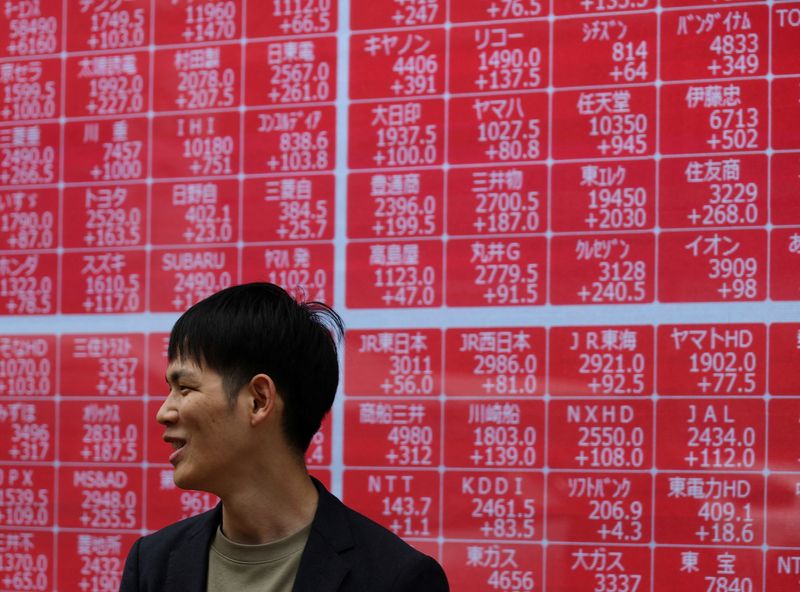
By Kevin Buckland
TOKYO (Reuters) - Japan’s Nikkei share average rose 1% on Friday to clock its best week in three months, as investors turned more hopeful that U.S. President Donald Trump would be able to broker trade deals with some of its top trading partners, including Japan.
The Nikkei touched a two-week high of 34,758.97 before ending the day up 1.03% at 34,730.28, despite somewhat muted trading due to the Easter holidays in most other markets.
The broader Topix added 1.14%.
The Nikkei climbed 3.41% for the week - the most since January 20 - to snap a three-week losing run.
On Thursday, Trump and close ally Italian Prime Minister Giorgia Meloni expressed optimism about resolving U.S.-European Union trade tensions. Trump also signalled a potential end to tit-for-tat tariff hikes with China.
A day earlier, Japan’s top negotiator, economy minister Ryosei Akazawa, kicked off dialogue in Washington, and told reporters afterwards that Trump had said getting a deal with Japan was a "top priority". Trump hailed discussions with Japan on social media, saying "Big Progress!"
"The mood seemed overall quite positive, underscored by Trump’s social media post featuring a smiling photo of him with Akazawa in the Oval Office," said James Brady, vice president at advisory firm Teneo.
"The general sense is that the discussions got off to a reasonable start."
Shipping was the second-best performer among the Tokyo Stock Exchange’s 33 industry groupings, gaining 2.92%.
Pharmaceuticals topped the list with a 4.68% jump, led by a 17.54% surge for Chugai Pharmaceutical after an obesity drug it developed and licensed to Eli Lilly (NYSE:LLY) performed well in clinical trials.

